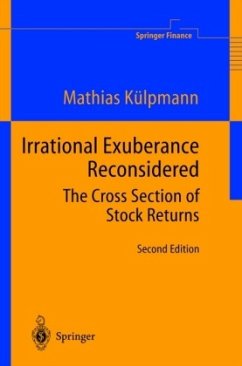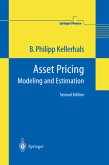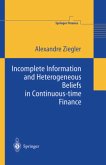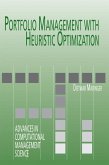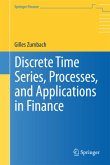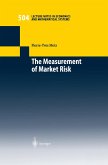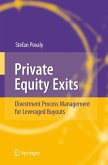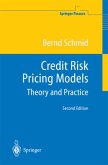Mathias Külpmann presents a framework to evaluate whether the stock market is in line with underlying fundamentals. The new and revised edition offers an up to date introduction to the controversy between rational asset pricing and behavioural finance. Empirical evidence of stock market overreaction are investigated within the paradigms of rational asset pricing and behavioural finance. Although this monograph will not promise the reader to become a millionaire, it offers a road to obtain a deeper understanding of the forces which drive stock returns. It should be of interest to anyone interested in what drives performance in the stock market.
Does the stock market overreact? Recent capital market turbulences have cast doubt whether the behaviour of stock markets is in line with rational investor behaviour. To which extent stock returns are predictable is the question at the heart of the controversy between the paradigms of rational asset pricing and behavioural finance. This new and revised edition discusses the empirical evidence from both perspectives. Theory and empirical analysis are blended with feedback from security analysts to offer a road towards a deeper understanding of the underlying forces to drive performance in the stock market.
In his book "Irrational Exuberance" Robert Shiller offered an analysis of the US stock market in 2000. The focus of his book was the level of the stock market, which he thought to be overvalued at the time. This monograph offers a complementary analysis of the cross section of stock returns.
Does the stock market overreact? Recent capital market turbulences have cast doubt whether the behaviour of stock markets is in line with rational investor behaviour. To which extent stock returns are predictable is the question at the heart of the controversy between the paradigms of rational asset pricing and behavioural finance. This new and revised edition discusses the empirical evidence from both perspectives. Theory and empirical analysis are blended with feedback from security analysts to offer a road towards a deeper understanding of the underlying forces to drive performance in the stock market.
In his book "Irrational Exuberance" Robert Shiller offered an analysis of the US stock market in 2000. The focus of his book was the level of the stock market, which he thought to be overvalued at the time. This monograph offers a complementary analysis of the cross section of stock returns.
From the reviews of the second edition:
"This book provides a highly stimulating contribution to the controversial discussion on stock return predictability, combining theory, thorough empirical analysis and feedback from security analysts." Günter Franke, Professor of International Finance, Chairman of the Center of Finance and Econometrics, University of Konstanz
"Irrational Exuberance Reconsidered takes a look at current turmoils in the stock market and provides an up to date discussion of the underlying issues." Harris Schlesinger, Professor of Finance and Frank Park Samford Chair of Insurance, University of Alabama
"State of the art analysis and new insights into the interaction between fundamentals and the stock market. Anybody interested in stock market overreaction should have a look." Winfried Pohlmeier, Professor of Economics and Econometrics, Research Professor at the Center of European Economic Research (ZEW)
"Compelling and intriguing: an interesting read for academics and practitioners alike. Current outlook: A strong buy." Dieter Hess, Professor of Finance, Hochschule für Bankwirtschaft, Frankfurt
"Combining academic research with practical experience, this book offers a new concept of a research monograph." Erik Lüders, Professor of Finance, Université Laval, Québec, and Visiting Scholar, Leonard N. Stern School of Business, New York University
"The present monograph investigates the so-called Winner-Loser Effect (WLE) and the questions, whether it may occur in rational pricing theory or is due to irrational behavior ... . In my view, this book on finance has impact on the modeling ... . Furthermore, the introductory review is from my understanding nice ... . each unit within the monograph has an own introduction, outline and summary and can be read independently ... . In conclusion, an interesting start for further research." (Andreas Bartel, ZentralblattMATH, Vol. 1089 (15), 2006)
"This book provides a highly stimulating contribution to the controversial discussion on stock return predictability, combining theory, thorough empirical analysis and feedback from security analysts." Günter Franke, Professor of International Finance, Chairman of the Center of Finance and Econometrics, University of Konstanz
"Irrational Exuberance Reconsidered takes a look at current turmoils in the stock market and provides an up to date discussion of the underlying issues." Harris Schlesinger, Professor of Finance and Frank Park Samford Chair of Insurance, University of Alabama
"State of the art analysis and new insights into the interaction between fundamentals and the stock market. Anybody interested in stock market overreaction should have a look." Winfried Pohlmeier, Professor of Economics and Econometrics, Research Professor at the Center of European Economic Research (ZEW)
"Compelling and intriguing: an interesting read for academics and practitioners alike. Current outlook: A strong buy." Dieter Hess, Professor of Finance, Hochschule für Bankwirtschaft, Frankfurt
"Combining academic research with practical experience, this book offers a new concept of a research monograph." Erik Lüders, Professor of Finance, Université Laval, Québec, and Visiting Scholar, Leonard N. Stern School of Business, New York University
"The present monograph investigates the so-called Winner-Loser Effect (WLE) and the questions, whether it may occur in rational pricing theory or is due to irrational behavior ... . In my view, this book on finance has impact on the modeling ... . Furthermore, the introductory review is from my understanding nice ... . each unit within the monograph has an own introduction, outline and summary and can be read independently ... . In conclusion, an interesting start for further research." (Andreas Bartel, ZentralblattMATH, Vol. 1089 (15), 2006)

